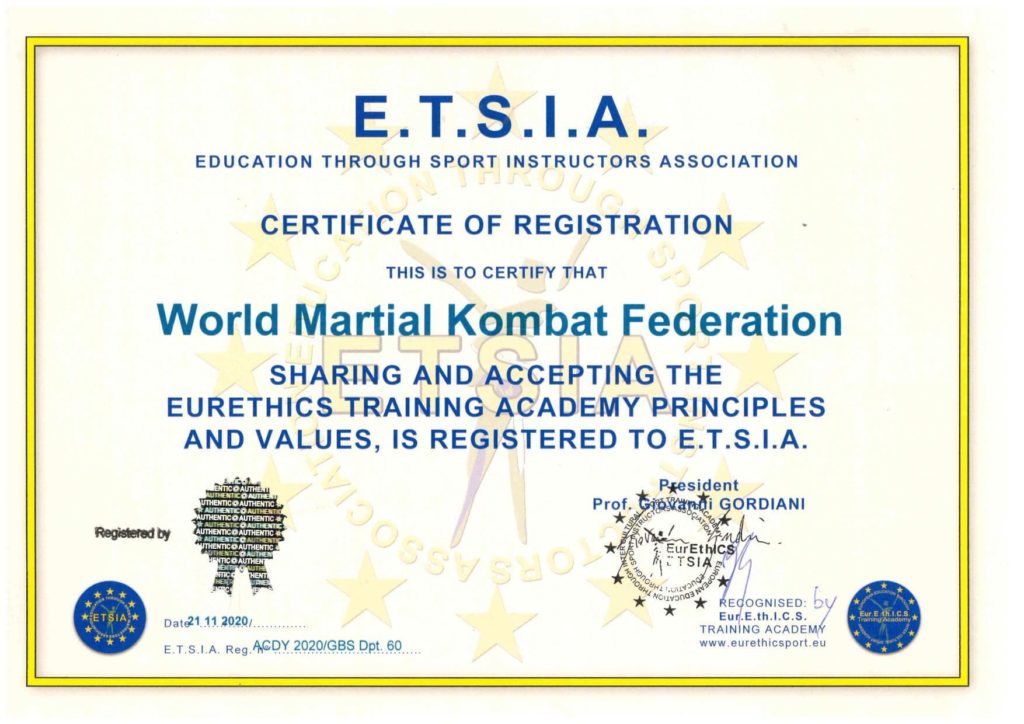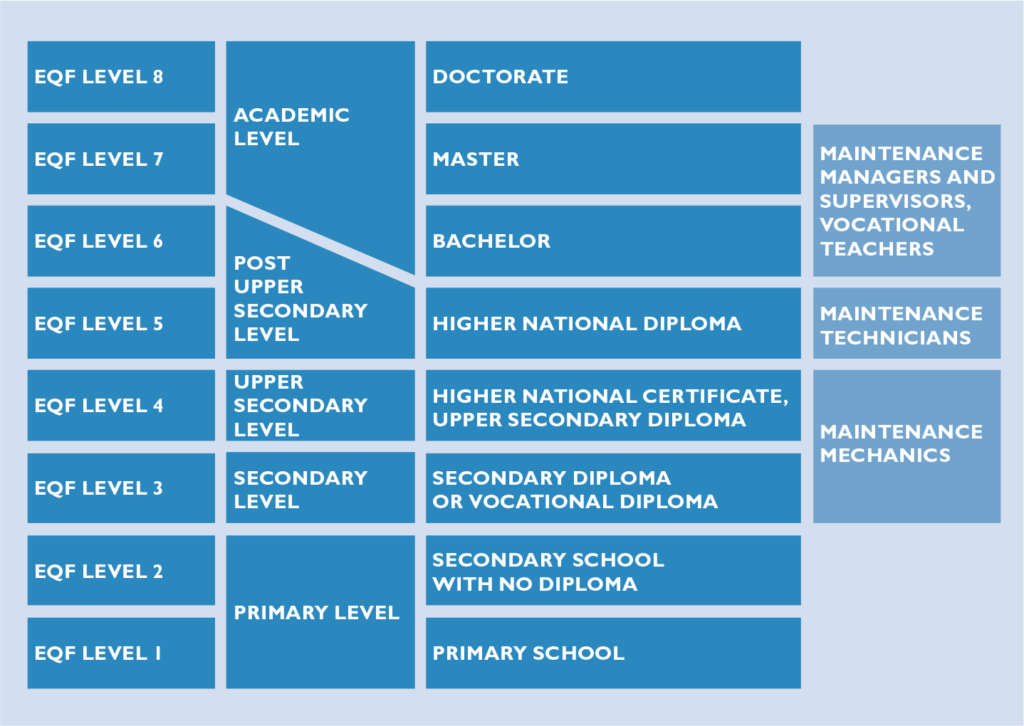


Presentation and Purposes
Within the WMKF, on October 3, 2020, “WMK Academy” was established.
The Academy operates on the European territory whose aim is promoting management training seminars, internships, certifications and courses according to EQF (European Qualifications Framework).
The Academy adheres to the European body “EurEthICS ETSIA”, headquarter in Brussel, authorized by the European Commission to control and issues EQF qualifications, up to the eighth level.
The European EQF certifications can also be issued to citizens belonging to non-EU countries.
The headquarters of the WMK Academy is in Geneva (Switzerland)
The Rector’s office is in via Mozart 20, 20081 Cassinetta – MILAN (Italy)
Academic Executives
Academic Professors
Academic Counselors
EurEthICS ETSIAProtocol
EQF European Qualifications
What is the EQF?
The EQF is an 8-level, learning outcomes-based framework for all types of qualifications that serves as a translation tool between different national qualifications frameworks. This framework helps improve transparency, comparability and portability of people’s qualifications and makes it possible to compare qualifications from different countries and institutions.
The EQF covers all types and all levels of qualifications and the use of learning outcomes makes it clear what a person knows, understands and is able to do. The level increases according to the level of proficiency, level 1 is the lowest and 8 the highest level. Most importantly the EQF is closely linked to national qualifications frameworks, this way it can provide a comprehensive map of all types and levels of qualifications in Europe, which are increasingly accessible through qualification databases.
The EQF was set up in 2008 and later revised in 2017. Its revision has kept the core objectives of creating transparency and mutual trust in the landscape of qualifications in Europe. Member States committed themselves to further develop the EQF and make it more effective in facilitating the understanding of national, international and third-country qualifications by employers, workers and learners.
What is the referencing process?
The EQF Recommendation invites Member States to reference their national qualifications frameworks or systems to the EQF, in order to establish a clear and transparent relationship between their national qualification levels and the eight EQF levels. Member States are recommended to review and update, when relevant, the referencing of the levels of the national qualifications frameworks or systems to the levels of the EQF.
Each country wanting to relate its national qualifications levels to the EQF has to prepare a detailed referencing report that follows the 10 EQF referencing criteria agreed in Annex III to the revised EQF Recommendation. National referencing reports are presented to the EQF Advisory Group which endorses them if they satisfy the referencing criteria.
Once national frameworks are referenced to the EQF all newly issued qualifications (e.g. certificates, diplomas, certificate supplements, diploma supplements), and/or qualifications databases should in principle contain a clear reference to the appropriate EQF and NQF level.

| Level | Knowledge | Skills | Responsibility and autonomy | Example |
|---|---|---|---|---|
| In the context of EQF, knowledge is described as theoretical and/or factual. | In the context of EQF, skills are described as cognitive (involving the use of logical, intuitive and creative thinking) and practical (involving manual dexterity and the use of methods, materials, tools and instruments). | In the context of the EQF responsibility and autonomy is described as the ability of the learner to apply knowledge and skills autonomously and with responsibility | ||
| Level 1 | Basic general knowledge | basic skills required to carry out simple tasks | work or study under direct supervision in a structured context | (UK) RQF entry level 3.[2] |
| Level 2 | Basic factual knowledge of a field of work or study | basic cognitive and practical skills required to use relevant information in order to carry out tasks and to solve routine problems using simple rules and tools | work or study under supervision with some autonomy | (UK) GCSE Grades D-G, RQF Level 1, Scottish Intermediate 1;[2] (Finland) Lower secondary school |
| Level 3 | Knowledge of facts, principles, processes and general concepts, in a field of work or study | a range of cognitive and practical skills required to accomplish tasks and solve problems by selecting and applying basic methods, tools, materials and information | take responsibility for completion of tasks in work or study; adapt own behaviour to circumstances in solving problems | (UK) GCSE Grades A*-C, RQF level 2, Scottish Intermediate 2.[2] |
| Level 4 | Factual and theoretical knowledge in broad contexts within a field of work or study | a range of cognitive and practical skills required to generate solutions to specific problems in a field of work or study | exercise self-management within the guidelines of work or study contexts that are usually predictable, but are subject to change; supervise the routine work of others, taking some responsibility for the evaluation and improvement of work or study activities | (UK) A-level, RQF level 3, Scottish Higher;[2] Abitur (Germany), Matura, Baccalauréat (France), vocational school, (Netherlands) Voorbereidend wetenschappelijk onderwijs. |
| Level 5[Note 1] | Comprehensive, specialised, factual and theoretical knowledge within a field of work or study and an awareness of the boundaries of that knowledge | a comprehensive range of cognitive and practical skills required to develop creative solutions to abstract problems | exercise management and supervision in contexts of work or study activities where there is unpredictable change; review and develop performance of self and others | (UK) HNC, HND, Foundation Degree, RQF levels 4 & 5, Certificate of Higher Education, Diploma of Higher Education, Scottish Advanced Higher,[2] HTL |
| Level 6[Note 2] | Advanced knowledge of a field of work or study, involving a critical understanding of theories and principles | advanced skills, demonstrating mastery and innovation, required to solve complex and unpredictable problems in a specialised field of work or study | manage complex technical or professional activities or projects, taking responsibility for decision-making in unpredictable work or study contexts; take responsibility for managing professional development of individuals and groups | (UK) Bachelor’s degree with honours, Bachelor’s Degree without honours, RQF level 6, Graduate Certificate, Graduate Diploma;[2] (Germany) Vocational university German State-certified Engineer, Business Manager and Designer (Fachhochschule) Bachelor, German Fachwirt / Fachkaufmann, German Operative Professional, German Meister; (Spain) Diplomado or Grado; (Italy) Laurea |
| Level 7[Note 3] | Highly specialised knowledge, some of which is at the forefront of knowledge in a field of work or study, as the basis for original thinking and/or researchCritical awareness of knowledge issues in a field and at the interface between different fields | specialised problem-solving skills required in research and/or innovation in order to develop new knowledge and procedures and to integrate knowledge from different fields | manage and transform work or study contexts that are complex, unpredictable and require new strategic approaches; take responsibility for contributing to professional knowledge and practice and/or for reviewing the strategic performance of teams | (UK) Master’s degree, Postgraduate Certificate, Postgraduate Diploma, RQF level 7;[2] (Germany) Vocational university (Fachhochschule) Master’s, Geprüfter Betriebswirt (IHK) (Certified Business Administrator); (Italy) Laurea Magistrale, Master universitario di primo livello;[3] (Spain) Licenciado or Máster;[4] (Portugal) Mestrado;[5] (Greece) NTUA Diploma[6] |
| Level 8[Note 4] | Knowledge at the most advanced frontier of a field of work or study and at the interface between fields | the most advanced and specialised skills and techniques, including synthesis and evaluation, required to solve critical problems in research and/or innovation and to extend and redefine existing knowledge or professional practice | demonstrate substantial authority, innovation, autonomy, scholarly and professional integrity and sustained commitment to the development of new ideas or processes at the forefront of work or study contexts including research | Doctorate, PhD, Professional Doctorate, RQF level 8;[2] (Italy) Dottorato di ricerca, Master universitario di secondo livello. |

